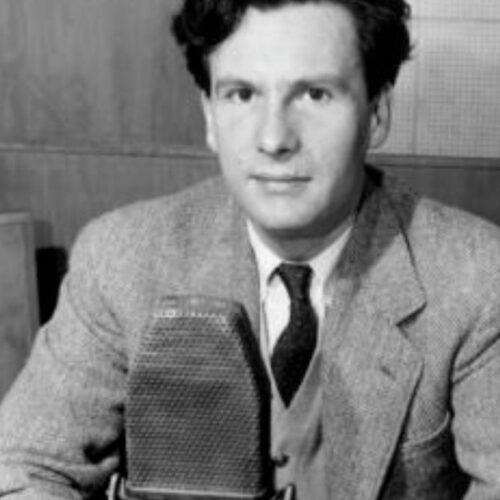

Ludovic Kennedy was a writer, journalist, and broadcaster, known for his investigations into miscarriages of justice. A human rights campaigner, he wrote about several high-profile murder cases, including the false conviction of Timothy Evans in Ten Rillington Place, the framing of Richard Hauptmann for the murder of Charles Lindbergh’s baby son, and the suicide of Stephen Ward in the Profumo case. He advocated for a change to the legal system in England to reduce the number of wrongful convictions. His work contributed greatly to the abolition of capital punishment in England in 1965. Anti-establishment despite his upbringing, he was an atheist who made clear his thoughts about God and religion in All in the Mind: A Farewell to God (1999).
Kennedy was born in Edinburgh in 1919. His father was Edward Kennedy, a naval captain and kinsman of the Earl of Cassilis, his mother Rosalind was the daughter of Sir Ludovic Grant of Dalvey, a baronet. Educated at Eton, and Oxford where he read Classics, he was a member of the Bullingdon Club and noted for living the high life (while at school, he once hired a plane for a jaunt to France for the day). He followed his father into the Royal Navy and recorded his experiences in his first book, Sub-Lieutenant: A Personal Record of War at Sea, published in 1942. Several books and films followed about famous naval battles (Scarpa Flow, Dieppe) and the hunt for the battleships Scharnhorst, Tirpitz, and the Bismarck (the sinking of which he witnessed on board HMS Tartar).
His media career began with A Third Reading, a poetry programme he presented from 1953-54; he had earlier won the finals of the English Festival of Spoken Poetry. Independent Television began in 1955 and he worked on Sunday Afternoon as an interviewer, and as a newscaster. There followed involvement with many landmark TV programmes: Panorama, Your Witness, Midweek (the precursor to Newsnight). He met his wife Moira Shearer, a ballerina, at a ball in 1949. They were married at Hampton Court in 1950, an event recorded in cinema newsreel as one of the weddings of the year. They had three daughters and a son.
Kennedy’s privileged background (he danced four nights with princesses Elizabeth and Margaret at Holyrood Palace) belied a fearless anti-establishment zeal. He wrote a play, Murder Story, about 19-year-old Derek Bentley, who was hanged in 1953 for the shooting of policeman Sidney Miles. Further evidence revealed that his 16-year-old companion, Christopher Craig, fired the fatal shot, but was too young to hang. After years of appeal, Bentley received a posthumous pardon in 1998.
Kennedy then wrote Ten Rillington Place, published in 1961, about Timothy Evans, whose wife and baby daughter were found murdered at the eponymous address in 1949. Evans was hanged, then later posthumously pardoned, when John Christie, a serial killer and lodger at the house was convicted. Another high-profile book followed, The Trial of Stephen Ward, about the controversial court case of the osteopath Stephen Ward, who allegedly ran a prostitution ring and was caught up in the Profumo scandal. Ward committed suicide in 1963. The thread running through all these cases was the weakness of the adversarial system of the courts, which was, according to Kennedy, ‘an invitation to the police to commit perjury.’
In 1932, the baby son of Charles Lindbergh, the world-famous aviator who had made history for the first non-stop flight (in 33 hours) from New York to Paris, was kidnapped from his home in New Jersey and later found dead. Richard Hauptmann was hanged for murder, but his widow insisted on his innocence. Kennedy questioned key evidence in The Airman and the Carpenter: The Lindbergh Kidnapping and the Framing of Richard Hauptmann.
A great communicator, Kennedy stood as Liberal candidate in 1958 in the Rochdale by-election, and in the 1959 general election, scoring well each time. A campaigner for voluntary euthanasia, he resigned from the Liberal Democrats in 2001 when they failed to place the policy in the manifesto despite party support. His autobiography, On My Way To The Club, presented Ludo, as he was affectionately known, at his affable best. He played himself in an episode of Yes, Prime Minister where he asked for the truth about unemployment. He was knighted in 1994. The revelation in his autobiography of a personal battle with anxiety came as a great surprise to many who saw him entirely at ease with himself.
Kennedy was an instinctive righter of wrongs. He has been cited as the single campaigner who brought about the abolition of the death penalty in the UK in 1965. He liked to quote Goethe: ‘Distrust all those in whom the urge to punish is strong.’ He was a supporter of the British Humanist Association and made his atheism public in his book All In The Mind: A Farewell to God. In it he argued that God was entirely a creation of the human imagination. His wife, Moira, died in 2006. Kennedy died in 2009, survived by his four children.
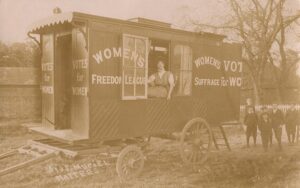
Dare to be free. Slogan of the Women’s Freedom League The Women’s Freedom League (WFL) was a militant suffrage organisation, […]
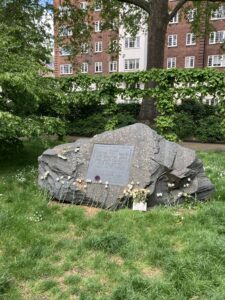
To all those who have established and who are maintaining the right to refuse to kill. Their foresight and courage […]
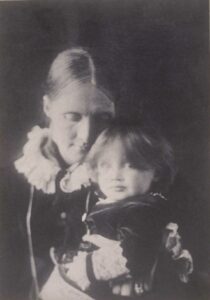
Purity of life, sincerity of action, obedience to law, love of our fellow creatures, all those qualities which ennoble life […]
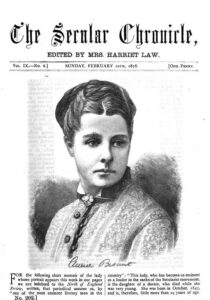
The object of Secularism is the promotion of human happiness in this world… [The Secularist] believes the surest way of […]